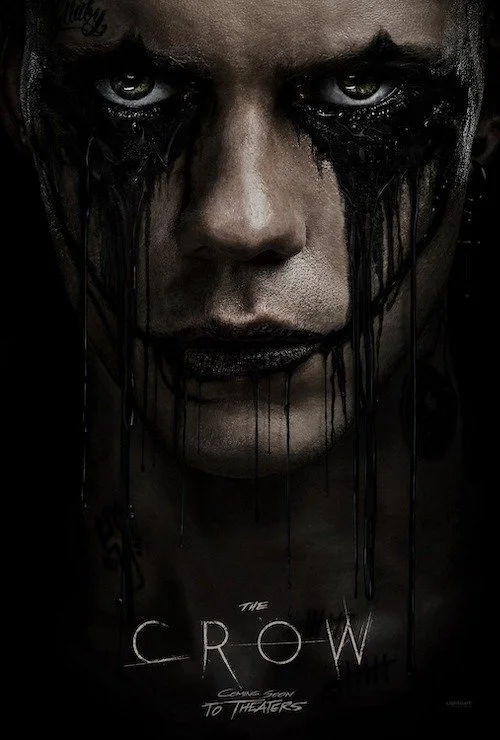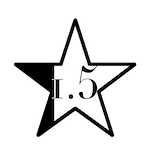The Crow (2024)
Written by Andreas Babiolakis
What is there to even write about here? Everyone was right. Naysayers aren’t always accurate in predicting something will be a dud just based on a trailer and some additional promotional materials, but this time they couldn’t have been more on the money. Seeing Bill Skarsgård in his tattooed guise and gothic getup felt like a major head-scratcher of a revelation akin to Jared Leto’s Hot Topic Joker look in Suicide Squad. Poor FKA Twigs was targeted as well; no cynicism will come from me as I consider her to be one of my favourite working musicians today, and a great talent in many respects (although I do hope for an even bigger, better opportunity on the big screen for her). All in all, The Crow looked to be as unnecessary as can be, considering that the original version starring the late Brandon Lee (which itself is an adaptation of the comic book series of the same name) is such a cult classic that is held dear to many to this day; from its central performance and shadowy visuals, to the iconic soundtrack and brooding nihilism, this original film has its audience who swear by it. It felt like their nostalgia goggles didn’t want this new adaptation by Rupert Sanders (known for other adaptations like Ghost in the Shell, and Snow White and the Huntsman). The truth is, like the other flaky, all-style, no-substance adaptations in his filmography, The Crow was dead on arrival (there’s no resurrection with this corpse), and everyone saw this coming from a mile away.
Skarsgård assumes Lee’s role as Eric Draven (and, ultimately, The Crow). This time, he meets the love of his life, Shelly (Twigs) in a rehab centre while she is hiding from the supernatural crimelord Vincent Roeg (Danny Huston). They escape when threatened, only to continue to fall deeper in love as quickly as a Disney princess and her suitor (only with a sex scene thrown in, because The Crow must be “mature” despite the juvenile and delusional speed of romance presented here, as if conjured up by a twelve year old who is looking forward to being a stud in high school and without any realistic concept of how love works). Very shortly afterwards (around twenty five minutes into the film), Roeg and his goons find our two protagonists and kill them. Eric awakens in the afterlife and meets a spirit guide (Sami Bouajila) who instructs him to kill Roeg and save Shelly’s soul. Eric is revived and becomes Death reincarnated, as he goes on a blood spilling mission to save the love of his life (or the past few days, so it feels). The speed of this film is way too fast, especially since Sanders is trying to sell you on the idea of this adaptation being more of a revenge-in-the-name-of-romance story (the love elements are heavily relied upon). Nothing is established effectively enough to matter.
The Crow is all style and no substance: a frustrating decision given that the film essentially proves that it never needed to exist.
It was nice seeing the opening credits be so stylish, as if they came from a music video from another dimension (think David Fincher’s The Girl with the Dragon Tattoo, or most of his films, really). It set the tone nicely for what we were going to see next, perhaps a bit too well. You see, it’s a problem when the entire film feels like a music video because that means that there is no narrative juice found within the film to justify what we are seeing. Music videos are rarely longer than a few minutes, and even the longer ones that are effectively short films go the distance to prove and justify their duration. When you’re watching a film that is an hour forty, you cannot feel like a music video — all artistic creativity and next to zero narrative purpose or prioritization — for the entire time. How can you convince an audience to care for that long when you yourself don’t care about delivering a story? Hell, star FKA Twigs herself has music videos that are more rich as story telling devices than The Crow, and her videos are meant to be poetic or abstract!
The Crow does look really nice with aesthetic imagination coming out of every corner of the screen. The only actor who seems to make it through to the other side is Skarsgård, who acts maybe too well in a film that doesn’t care about anything but appearances. Otherwise, The Crow is a tonal torture chamber with the story moving way too quickly and each scene feeling dragged out just to showcase more visual splendour; it kind of feels like someone trying to sell you something, and you’re convinced to buy the product within the first five seconds but are instantly put off shortly after and now feel like you have to stick around and hear the entire babbling, nonsensical pitch for twenty minutes because they simply won’t shut up. The Crow spends its entire time trying to sell you on the idea that it is a worthwhile, necessary adaptation instead of just being one. There are barely any new ideas or concepts — outside of the artistry, which means zilch in the grand scheme of things — presented here, nor are there any additions to change the message of the story in any way (see how the latest All Quiet on the Western Front becomes a cautionary tale about how many lives are cost with each prevention of a resolution during wartime, which is different than the strictly anti-war and anti-propaganda message of the first film, since many of us who are anti-war already know how we feel now).
Instead, The Crow feels entirely like a marketing idea that Hollywood is disgustingly guilty of in this day and age: project after project just to make more money as opposed to push the industry and artistic medium in new directions. Despite all the work that went into the costumes, makeup, and sets on this film, the rest of this project’s gestation feels painfully lazy, as if the initial board meeting was simply this: “You know how The Crow continues to sell really well? What if, instead of just allowing it to have its own legacy, we try to force feed another The Crow to the same audience and expect them not to taste a difference?” It’s the kind of mentality that fast food joints have; if you just like burgers, you’ll more than likely go for any burger by any chain, and you’ll settle for whatever restaurant pops up first on your long drive. Films aren’t fast food, and damn anyone who is fine with feeling like they can and should be. You could be enriched or entertained in ways you’ve never been before by those who care, not those who just want to make a buck in an industry which is being killed by the greedy business, entrepreneur-fucks who only view motion pictures as ways to turn a profit. Well, The Crow of 2024 likely won’t make its money back, and that is its best message: half baked ideas will not draw people in. Unfortunately, Hollywood will not listen to this moral, just like it hasn’t for years. It saddens me because it feels like the only people who had faith in The Crow is everyone in it and who helped piece this unfinished idea together. They suffer the most when the wealthy big wigs just try to do this all again when they try to make an adaptation of The Phantom of the Paradise next and expect to catch lightning in a bottle for a second time (for the billionth time).
Andreas Babiolakis has a Masters degree in Film and Photography Preservation and Collections Management from Toronto Metropolitan University, as well as a Bachelors degree in Cinema Studies from York University. His favourite times of year are the Criterion Collection flash sales and the annual Toronto International Film Festival.






